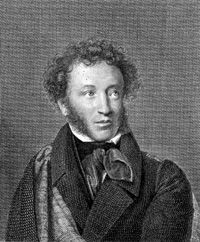
Aleksandr Pushkin
|
on view at Beinecke
An exhibition celebrating Russian literature is on view at the Beinecke Rare Book & Manuscript Library, 121 Wall St., now through July 15.
"Pushkin to Nabokov: Russian Literature at Yale," celebrates the bicentenary of Aleksandr Pushkin (1799-1837), considered to be Russia's greatest writer, and the centenary of Vladimir Nabokov (1899-1977), the best-known exiled Russian writer of the 20th century. The two writers were permanently linked in 1964 when Nabokov published his controversial English version of Pushkin's "Eugene Onegin," a verse novel of failed love and senseless death.
The exhibition at the Beinecke begins with an array of Pushkin's works in their first editions. Before dying at age 38 in a duel, Pushkin wrote lyric poetry, narrative poems and tales ("The Gypsies," "Count Nulin" and "The Bronze Horseman"), prose fiction (the so-called Belkin tales, "The Queen of Spades" and "The Captain's Daughter") and plays, such as "Boris Godunov," establishing his reputation as Russia's national poet.
On display from the "Golden Age," demarked by Pushkin's death in 1837 and Anton Chekhov's in 1904, are Nikolay Gogol's novel "Dead Souls," Ivan Turgenev's "Fathers and Sons," Leo Tolstoy's "Anna Karenina" and Fyodor Dostoyevsky's "The Possessed," as well as the 1897 edition of Chekhov's "Plays," which includes the first book appearance of "The Seagull" and "Uncle Vanya."
Authors of the "Silver Age" (1900-17) represented in the exhibition include the poet Konstantin Bal'mont and the short story writer Ivan Alekseyevich Bunin, who won the Nobel Prize for literature in 1933. Maxim Gorky was the most famous member of this literary generation; his novel "Mother" is also on display.
On view from the early decades of the last century are the works of Vladimir Mayakovsky, the most prominent member of the Futurist movement, along with books and collaborative publications by Velimir Khlebnikov and Iliazd, among others.
The 20th-century section of the exhibition includes four tiny volumes, all published in the 1920s, by the acclaimed poet Anna Akhmatova, and four titles by Marina Tsvetaeva. Boris Pasternak, who won the Nobel Prize in 1958 for his novel "Doctor Zhivago," is represented by an early volume of poems. Books written by Nina Berberova, whose international renown began with the French translation of her story "The Accompanist," as well as books once owned by her, constitute an important part of the exhibition. Berberova's papers are held at the Beinecke Library.
The author of "Lolita" is represented by books spanning four decades. Nabokov is one of a handful of authors who have written successfully in two languages. The exhibition includes five novels from the Russian phase of his career as well as his first novel in English, "The Real Life of Sebastian Knight," the first edition of "Lolita," which was published in Paris because no American firm would accept it, the "Eugene Onegin" translation and his autobiography.
The Beinecke is open for exhibition viewing Monday-Friday 8:30 a.m.-5 p.m. and Saturday 10 a.m.-5 p.m. For more information, call (203) 432-2977.
T H I S
Bulletin Home
 W E E K ' S
W E E K ' S S T O R I E S
S T O R I E S![]()
 Conservationist's gift establishes environmental studies professorship
Conservationist's gift establishes environmental studies professorship![]()
![]()
 More attention to the environment is needed, EPA administrator says
More attention to the environment is needed, EPA administrator says![]()
![]()
 Graduate students honor their mentors with a new award
Graduate students honor their mentors with a new award![]()
![]()
 Twelve individuals honored for improving town-gown connections
Twelve individuals honored for improving town-gown connections![]()
![]()
 Mammograms lower rate of breast cancer recurrence, study finds
Mammograms lower rate of breast cancer recurrence, study finds![]()
![]()
 Talk marks opening of center for children exposed to violence
Talk marks opening of center for children exposed to violence![]()
![]()
 Scholar decries abuse of women to create pornography
Scholar decries abuse of women to create pornography![]()
![]()
 Baseball commissioner talks about players' responsibility
Baseball commissioner talks about players' responsibility![]()
![]()
 Event examines life, work of controversial Yiddish writer
Event examines life, work of controversial Yiddish writer![]()
![]()
 Student drama centers on play once charged with being obscene
Student drama centers on play once charged with being obscene![]()
![]()
 Exhibit to explore how artists depicted Africa in 20th century
Exhibit to explore how artists depicted Africa in 20th century![]()
![]()
 Satellite images aid study of environmental threats in Africa
Satellite images aid study of environmental threats in Africa![]()
![]()
 Celebration of Russian literature on view at Beinecke
Celebration of Russian literature on view at Beinecke![]()
![]()
 Architecture project benefits 'fragile' city neighborhood
Architecture project benefits 'fragile' city neighborhood![]()
![]()
 Yale student groups honored for service to community
Yale student groups honored for service to community![]()
![]()
 Yale Physicians Building to be city's newest art exhibit space
Yale Physicians Building to be city's newest art exhibit space![]()
![]()
 Graduate student scientists sharing their research at two-day symposium
Graduate student scientists sharing their research at two-day symposium![]()
![]()
 Agrarian Studies marks 10th year with conference
Agrarian Studies marks 10th year with conference![]()
![]()
 In thanks,Yale physician receives Yankees baseball
In thanks,Yale physician receives Yankees baseball![]()
![]()
 English Department alumni will consider 'Prospects for the New Century'
English Department alumni will consider 'Prospects for the New Century'![]()
![]()
 Memorial service to celebrate life of John Blassingame
Memorial service to celebrate life of John Blassingame![]()
![]()
 Divinity School Search Committee Correction
Divinity School Search Committee Correction![]()
![]()
 Campus Notes
Campus Notes![]()
![]()
 Yale Scoreboard
Yale Scoreboard![]()
![]()
 In the News
In the News![]()
 |
| Visiting on Campus
Visiting on Campus |
| Calendar of Events
Calendar of Events |
| Bulletin Board
Bulletin Board![]()
Classified Ads |
| Search Archives
Search Archives |
| Production Schedule
Production Schedule |
| Bulletin Staff
Bulletin Staff![]()
Public Affairs Home |
| News Releases
News Releases |
| E-Mail Us
E-Mail Us |
| Yale Home Page
Yale Home Page